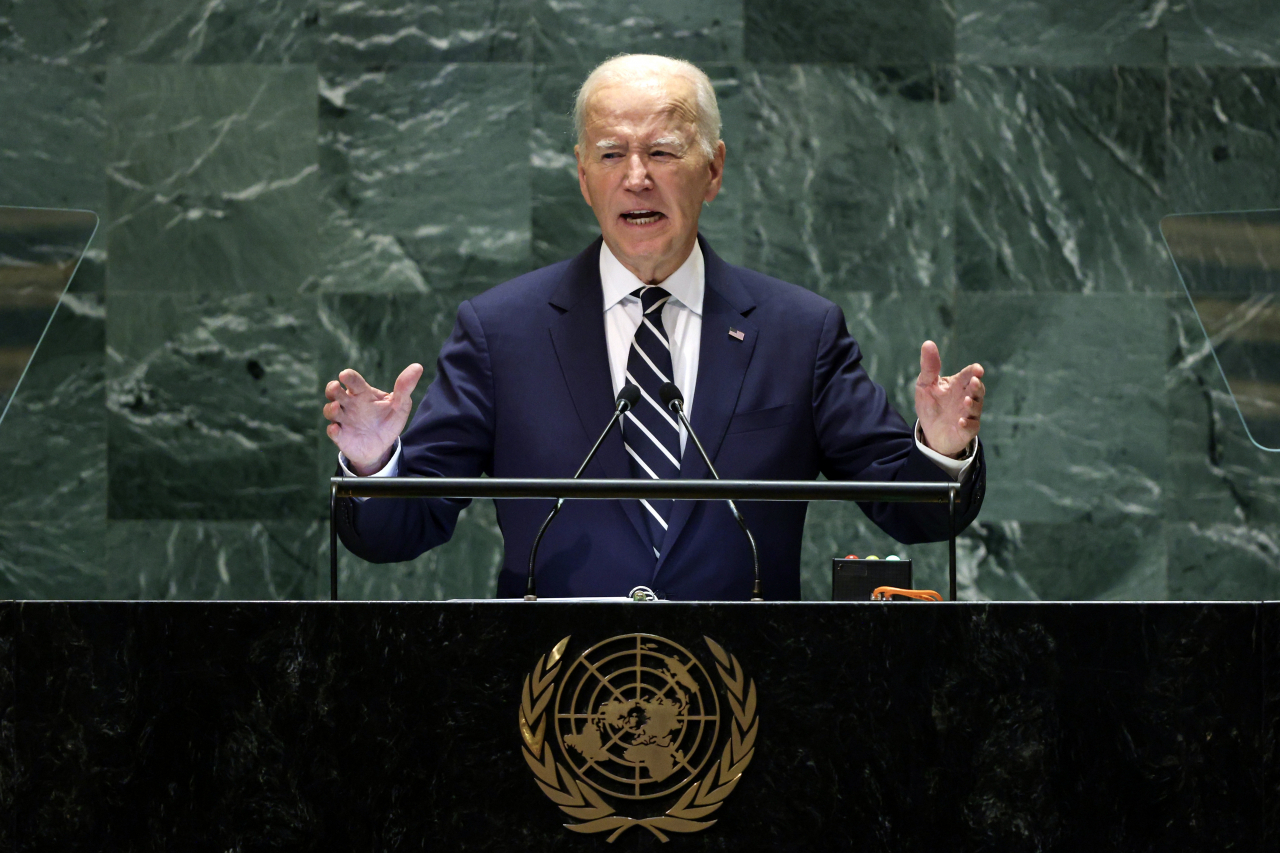 |
US President Joe Biden addresses the 79th session of the United Nations General Assembly at UN headquarters in New York on Sept. 24, in this photo released by the Associated Press. (Yonhap) |
US President Joe Biden on Tuesday made no reference to North Korea in his fourth and final speech to the UN General Assembly as president, though he stressed his commitment to diplomacy with Pyongyang and decried its sanctions violations in past addresses to the annual high-level gathering.
The absence of his reference to the North came as Washington's repeated overtures for dialogue with the recalcitrant regime have gone unanswered with Pyongyang doubling down on its nuclear and missile programs and deepening its military cooperation with Moscow.
In this week's speech, Biden touched on a series of regional and global security issues, including the United States' strategic competition with China, Russia's war in Ukraine, Iranian threats and instability in the Middle East, but North Korea was absent from his list of foreign policy challenges.
In particular, Biden called for joint efforts to ensure that "Iran will never ever obtain a nuclear weapon." But he did not make such a call regarding North Korea's advancing nuclear program.
His UN remarks stood in contrast with his past speeches to the General Assembly.
In his address last year, Biden condemned the North's continued violations of UN Security Council resolutions, but underscored that the US is "committed to diplomacy that would bring about the denuclearization of the Korean Peninsula."
In his 2022 address, Biden pointed out that Pyongyang continued to "blatantly" violate UN sanctions despite America's efforts to begin "serious and sustained" diplomacy,
In 2021, he made a lengthier mention of North Korea, emphasizing that his administration seeks "serious and sustained diplomacy to pursue the complete denuclearization of the Korean Peninsula."
"We seek concrete progress toward an available plan with tangible commitments that would increase stability on the Peninsula and in the region, as well as improve the lives of the people in the Democratic People's Republic of Korea," he said in the 2021 speech, referring to the North by its official name.
Given that the US has often cited security challenges from China, Russia, Iran and North Korea as among its top major threats, the absence of any reference to the North has raised questions over whether the president intended to deliver any tacit message to the recalcitrant regime.
The speech came after Pyongyang has ratcheted up tensions through its rare disclosure of a uranium enrichment facility, display of a new road-mobile launcher apparently for intercontinental ballistic missiles and continued weapons tests.
The latest bouts of the North's saber-rattling added to concerns that Pyongyang could engage in major provocations, including what would be its seventh nuclear test, near the US presidential election in November.
Some analysts said that in his UN address, Biden focused more on a range of issues, where he could make more progress before his term ends in January, rather than on the seemingly intractable North Korean nuclear conundrum that has eluded his predecessors.
In Tuesday's speech, Biden mentioned South Korea one time.
"We've seen citizens across the world peacefully choosing their future -- Ghana to India to South Korea -- nations representing one quarter of humanity who will hold elections this year alone," he said.
The president also explained what he called a "difficult" decision to drop out of the presidential race.
"I decided, after 50 years of public service, (that) it's time for a new generation of leadership to take my nation forward. My fellow leaders, let us never forget some things are more important than staying in power," he said. "It's people that matter the most. We are here to serve the people, not the other way around." (Yonhap)






![[Weekender] Korea's traditional sauce culture gains global recognition](http://res.heraldm.com/phpwas/restmb_idxmake.php?idx=644&simg=/content/image/2024/11/21/20241121050153_0.jpg)
